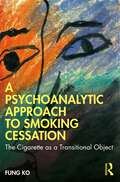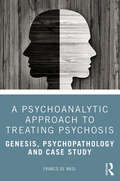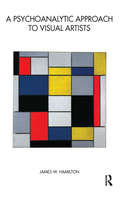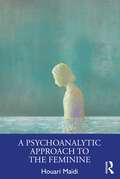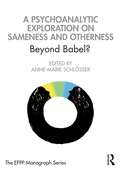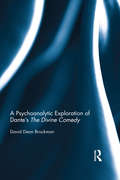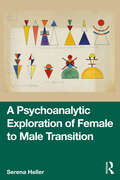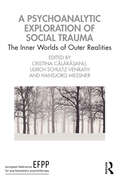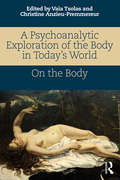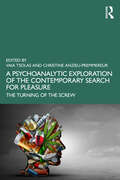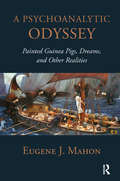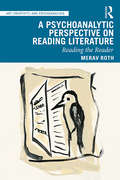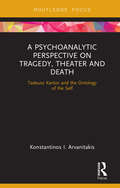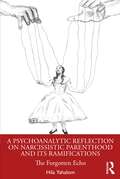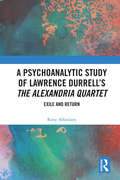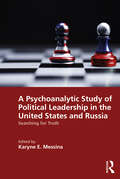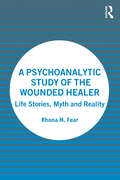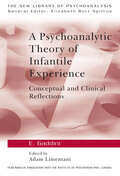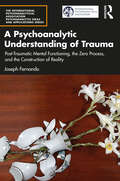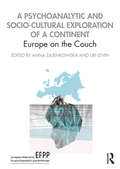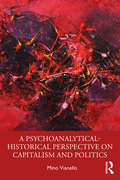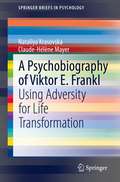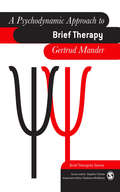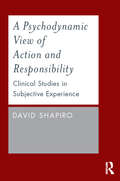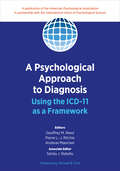- Table View
- List View
A Psychoanalytic Approach to Smoking Cessation: The Cigarette as a Transitional Object
by Fung KoA Psychoanalytic Approach to Smoking Cessation: The Cigarette as a Transitional Object provides an accessible understanding to the unconscious motive behind smoking addiction using Winnicott’s concept of the transitional object. The book is divided thematically into six parts. Ko begins by outlining the conscious motives for smoking from a psychological perspective and looks at commercial research conducted by the tobacco industry, before using psychoanalytically informed cross-disciplinary literature to assess the unconscious motives for smoking. She expertly introduces Winnicott’s view on smoking addiction, using his concept of the transitional object, and highlights the power of the Free Association Narrative Interview method in accessing the unconscious and embedded emotional experiences. Using clinical examples, she illustrates the benefits of this method as a tool to elicit free associations from research respondents. She details the parallels between the individual respondents’ smoking experience, as well as their relationship with cigarettes and the seven qualities of transitional objects outlined by Winnicott in his 1953 landmark paper. Ko concludes by emphasising the significance and implications of this thesis to smokers and public health policy, as well as the smoking cessation approach and proposed directions for future research. This book is an essential resource for psychoanalysts and psychotherapists working in smoking cessation organisations, as well as those working in addiction services.
A Psychoanalytic Approach to Treating Psychosis: Genesis, Psychopathology and Case Study
by Franco de MasiA Psychoanalytic Approach to Treating Psychosis shows how, by understanding the antecedents and dynamics of psychosis, a psychoanalytic approach can offer a long-term alternative to the only psychotropic therapy and an explanation of the infantile origin of the illness. This ground-breaking examination begins by clearly explaining complex terms and theories from the most significant thinkers in psychoanalysis. Split into three parts, it then explores the problems faced when following one specific technique for understanding the psychotic process. Practical as well as theoretical, Part 2 illustrates how to prepare an appropriate setting for the patient, including the importance of listening and the analyst’s approach, as well as highlighting key features of the condition, such as delusions, hallucinations, infantile withdrawal and psychotic dreams. Acknowledging that psychosis is a psychic transformation which the mind works as a sensorial organ, the author asserts that the seeds are sown in childhood through emotional trauma, leading to withdrawal into a fantasy world. Brimming with real-life vignettes throughout, Part 3 is dedicated to a unique and lengthy case study to illustrate the challenges of working with such patients. It also looks positively towards future research on psychosis informed by insights from neuroscience. Innovative and accessible, this book will be essential reading for anyone working in psychosis, including psychoanalysts, psychiatrists, psychologists and physicians.
A Psychoanalytic Approach to Visual Artists
by James W. HamiltonJames Hamilton's engaging book offers us his own unique insight into the unconscious factors involved in the creative processes associated with painting, filmmaking, and photography by studying the lives and works of a number of artists, each one having a unique personal style. In separate chapters, he looks at the lives and works of Mark Rothko, Joseph Cornell, Piet Mondrian, Pablo Picasso, Clement Greenberg, Edward Weston, Ingmar Bergman, Francois Truffaut, Quentin Tarantino, and Florian von Donnersmarck from a psychoanalytic perspective with emphasis on unconscious motivation and the quest for mastery of intrapsychic conflict. The book is bound to encourage further questions and hypotheses about the nature of these complex phenomena.
A Psychoanalytic Approach to the Feminine
by Houari MaïdiA Psychoanalytic Approach to the Feminine sees Houari Maïdi dissect the concepts and characteristics of the feminine in both males and females, separating them from womanhood and femininity, and equipping readers with the tools to better understand pathologies such as masochism, narcissism, depression, and paranoia.Starting from Freud’s binary depiction of gender identity through the lens of bisexuality, Maïdi seeks to redress the way in which traditional psychoanalysis considers sexual characteristics. He separates the feminine from gender, showing how historically misogynistic theories in psychoanalysis have potentially damaged the progress of the field, as well as female and male analysands alike. Depictions of the feminine are considered through their relationship with traumatic seduction, mourning and melancholy to address questions related to different clinical and psychopathological representations.Using clinical vignettes throughout, this book is essential reading for psychoanalysts and those interested in the intersection between gender and analysis.
A Psychoanalytic Exploration On Sameness and Otherness: Beyond Babel?
by Anne-Marie SchlösserIn dialogue with the most famous myth for the origin of different languages – The Tower of Babel – A Psychoanalytic Exploration on Sameness and Otherness: Beyond Babel? provides a series of timely reflections on the themes of sameness and otherness from a contemporary psychoanalytic perspective. How are we dealing with communication and its difficulties, the confusion of tongues and loss of common ground within a European context today? Can we move beyond Babel? Confusion and feared loss of shared values and identity are a major part of the daily work of psychoanalytic psychotherapists. Bringing together an international range psychoanalytic practitioners and researchers, the book is divided into six parts and covers an array of resonant topics, including: language and translation; cultural identity; families and children; the cyber world; the psychotherapeutic process; and migration. Whereas the quest for unity, which underpins the myth of Babel, leads to mystification, simplification, and the exclusion of people or things, multilingual communities necessitate mutual understanding through dialogue. This book examines those factors that further or threaten communication, aiming not to reduce, but to gain complexity. It suggests that diversification enriches communication and that, by relating to others, we can create something new. As opposed to cultural and linguistic homogeneity, Babel is not only a metaphor for mangled communication, alienation, and distraction, it is also about the acceptance or rejection of differences between self and other. This book will be of great interest to psychoanalytic psychotherapists and researchers from a wide variety of backgrounds.
A Psychoanalytic Exploration of Dante's The Divine Comedy
by David Dean BrockmanDavid Dean Brockman connects spirituality with psychoanalysis throughout this book as he looks at Dante’s early writings, his life story and his "polysemous" classical poem The Divine Comedy. Dante wanted to create a document that would educate the common man about his journey from brokenness to growth and a solid integration of body, self, and soul. This book draws the resemblance between Dante’s poem and the "journey" that patients experience in psychoanalytic therapy. It will be the first total treatment of Dante’s work in general, and The Divine Comedy in particular, using the psychoanalytic method. This fascinating study of Dante’s The Divine Comedy will be of interest to psychoanalysts, psychotherapists, and psychiatrists, as well as those still in training. Academics and students of psychology, spirituality, religion, and literature may also be interested in Brockman’s in-depth study of Dante’s work.
A Psychoanalytic Exploration of Female to Male Transition
by Serena HellerDrawing on theory from a range of schools of psychoanalytic thought, this timely book addresses and explores the phenomenon of the increasing number of people who were assigned female at birth and now identify as male, and what might underly the cultural pull to remove femaleness from self and body.In A Psychoanalytic Exploration of Female to Male Transition, Serena Heller considers how early recognition of the difference between the sexes might evoke a melancholic attitude towards one’s anatomy, as being one sex and not the other. She considers the ramifications of the developing sexual bodies of young women at a time when they are having great difficulty accepting them, addressing the complexity of female sexual development in relation to sexual aim and object, and how manifestations of early bisexuality can resurface during puberty. Focusing solely on the experience of female-to-male transition, rather than making broad assumptions of a universal trans experience, Heller provides a depth of theoretical analysis of biological and psychic aspects of female sexuality, and trans gender identifications.Empathetic in its approach and thorough in its conceptualisation, this volume is a vital resource for psychodynamic and psychoanalytic psychotherapists working directly with trans patients, and with those experiencing gender dysphoria and issues of sexual identity. The book assumes no prior expertise in analytic thought, and is designed to help mental health practitioners, students and researchers engaged in queer studies, gender studies and the intersection of psychoanalytic thought and gender identity.
A Psychoanalytic Exploration of Social Trauma: The Inner Worlds of Outer Realities
by Cristina Călărășanu Ulrich Schultz-Venrath Hansjorg MessnerA Psychoanalytic Exploration of Social Trauma presents a thorough introduction to social trauma from a range of perspectives, exploring several key themes, specific causes and symptoms and clinical interventions. With chapters from a diverse range of authors, the book considers social trauma as it relates to stories and history, group identity, the consulting room, migration, and post-traumatic conditions. These topics are explored via a range of frames, including individual therapy, group analysis, social dream matrix, large groups, case studies, narrative recollections, and cinematographic expression. The book also considers the implications of new technology in causing and treating social trauma. A Psychoanalytic Exploration of Social Trauma will be of great interest to psychoanalytic psychotherapists in practice and in training, psychoanalysts, and psychoanalytically informed professionals working with trauma.
A Psychoanalytic Exploration of the Body in Today's World: On The Body
by Vaia Tsolas Christine Anzieu-PremmereurA Psychoanalytic Exploration of the Body in Today's World: On the Body examines the importance of the body in everyday psychoanalytic practice and beyond. Written by world leading clinicians and international scholars, this important book aims to relocate the psychoanalytic body in the modern, more challenging world. Bringing together perspectives from across the range of psychoanalytic schools of thought, it covers essential analytic topics such as family and parenting, sex and gender, illness and psychosomatics, and concepts of the body in infancy. Though in Freud’s writing the intertwining of body and psyche is fundamental, psychoanalytic thought has sometimes downplayed or ignored this idea. This book returns the body to its rightful place in psychoanalysis, and brings the body into the contemporary world of technology and change, offering fresh insight into the sick body, the sexual body, the speaking body, the body of the changing family in which the traditional gendered labels no longer fit seamlessly, gender dynamics and much more. A Psychoanalytic Exploration of the Body in Today's World gives renewed and increased emphasis to an essential tenant of psychoanalysis. With contributions from some of the most important modern psychoanalysts, this book will prove an essential work for both psychotherapists and academics.
A Psychoanalytic Exploration of the Contemporary Search for Pleasure: The Turning of the Screw
by Vaia Tsolas Christine Anzieu-PremmereurThis interdisciplinary collection of essays explores the malaise of the contemporary individual by returning the economic point of view of Freudian thinking, the concept of satisfaction, libido, and pleasure–unpleasure principle to their rightful place as the motivating forces of human existence. For Freud, pleasure stands apart from other human experiences, side by side with unpleasure, always a bonus in the search for satisfaction of the pleasure principle and beyond. Along with libido, emotional fulfillment, and the capacities for sublimation and play, pleasure has not been given enough attention in the psychoanalytic literature. The editors of this book address this lack and highlight the importance of examining today’s social and individual malaise through these specific lenses of inquiry. It is particularly timely and important today to address this lack, and thereby examine the impact of the social phenomena of the pandemic, the crises of ideals and virtuality on the subject who feels in a state of constant emergency, overwhelmed, addicted, and delibidinalized. With contributions from across psychoanalysis, this book is essential reading for psychoanalysts in training and in practice who want to understand how the modern world has shaped our understanding of pleasure.
A Psychoanalytic Odyssey: Painted Guinea Pigs, Dreams, and Other Realities
by Eugene J. MahonThis book is a creative psychoanalytic odyssey, a most intriguing psychological voyage. It explores many of the most basic, fundamental concepts of psychoanalysis, including repression, insight, transference, play, child analysis, jokes, puns, and parapraxes as well as the uncanny in dreams.
A Psychoanalytic Perspective on Reading Literature: Reading the Reader (Art, Creativity, and Psychoanalysis Book Series)
by Merav RothWhat are the unconscious processes involved in reading literature? How does literature influence our psychological development and existential challenges? A Psychoanalytic Perspective on Reading Literature offers a unique glimpse into the unconscious psychic processes and development involved in reading. The author listens to the 'free associations' of various literary characters, in numerous scenarios where the characters are themselves reading literature, thus revealing the mysterious ways in which reading literature helps us and contributes to our development. The book offers an introduction both to classic literature (Poe, Proust, Sartre, Semprún, Pessoa, Agnon and more) and to the major psychoanalytic concepts that can be used in reading it – all described and widely explained before being used as tools for interpreting the literary illustrations. The book thus offers a rich lexical psychoanalytic source, alongside its main aim in analysing the reader’s psychological mechanisms and development. Psychoanalytic interpretation of those literary readers opens three main avenues to the reader’s experience: the transference relations toward the literary characters; the literary work as means to transcend beyond the reader’s self-identity and existential boundaries; and mobilization of internal dialectic tensions towards new integration and psychic equilibrium. An Epilogue concludes by emphasising the transformational power embedded in reading literature. The fascinating dialogue between literature and psychoanalysis illuminates hitherto concealed aspects of each discipline and contributes to new insights in both fields. A Psychoanalytic Perspective on Reading Literature will be of great interest not only to psychoanalytic-psychotherapists and literature scholars, but also to a wider readership beyond these areas of study.
A Psychoanalytic Perspective on Tragedy, Theater and Death: Tadeusz Kantor and the Ontology of the Self
by Konstantinos I. ArvanitakisA Psychoanalytic Perspective on Tragedy, Theater and Death shines a spotlight on what theater, and especially tragedy, tells us about our ontological selves, by exploring both Euripides’ Bacchae and the work of Tadeusz Kantor. Focusing on the theatrical tradition of the West, the book examines Euripides’ Bacchae, a tragedy about the nature of tragedy, suggesting that the tragic can be defined as an ontological duality rooted in the early experience of the infant’s separation from mother, with whom s/he had, until then, formed a fused Unit. The traumatic rupture of this primal Unit is inscribed in the unconscious as death. The book then considers the defining binary structure of the theatrical setting – (spectator/spectated or fantasy/reality) – before arguing that in staging our ontological dividedness, theater shows its relation to death to be organic. The book concludes by examining in detail the principal works of Polish theater director Tadeusz Kantor, whose search for theater’s identity was, essentially, a search for human identity. Erudite and far-reaching, A Psychoanalytic Perspective on Tragedy, Theater and Death will interest psychoanalysts as well as students, scholars and researchers across the dramatic arts wishing to draw on psychoanalytic ideas.
A Psychoanalytic Reflection on Narcissistic Parenthood and its Ramifications: The Forgotten Echo
by Hila YahalomA Psychoanalytic Reflection on Narcissistic Parenthood and its Ramifications: The Forgotten Echo proposes a new perspective on narcissism, focusing on its destructive impact within relationships.Hila Yahalom discusses the patterns and ramifications of traumatizing upbringing by narcissistic parents, exploring the resulting development of a defensive-behavioral pattern and personality structures in the child which constitutes a mirror image of narcissism. Yahalom assesses a wide range of psychoanalytic theories in presenting a broad outlook on narcissism, its roots, and the manner by which pathological narcissism may manifest in interpersonal relationships as ‘narcissistic abuse’. This book considers the narcissist’s perverted occupation of the psychic space of others, with both participants usually blind to the phenomenon – a blindness that is reenacted in therapy, affecting its course. This book contains clinical vignettes from the author’s work as well as examples from the life stories of Heinz Kohut (Mr. Z), Franz Kafka, and Maria Callas.A Psychoanalytic Reflection on Narcissistic Parenthood and its Ramifications: The Forgotten Echo will be of great interest to psychoanalysts and other clinicians working with narcissism, parenthood, and dysfunctional family relationships.
A Psychoanalytic Study of Lawrence Durrell’s The Alexandria Quartet: Exile and Return
by Rony AlfandaryA Psychoanalytic Study of Lawrence Durrell’s The Alexandria Quartet: Exile and Return focuses on the dialogue created by literature and psychoanalysis in an individual’s quest to explore existential issues, such as a sense of belonging to a homeland and a recurring sense of the Uncanny (das unheimliche). Rony Alfandary explores Durrell’s attempt to recreate a sense of belonging to a homeland, which perhaps never existed but can be retraced and reinvented through writing. This book studies some issues present in Durrell’s work: the connection between biographical and fictional elements in the study of literature the influence of early Freudian theoretical themes upon the writer later influences including post-modern and hermeneutic theories The life and work of Lawrence Durrell can serve as a prototype of a man’s quest for meaning, in a world caught in turmoil in the period between and during WW2. The author’s psychoanalytic exploration of the work and its relevance to human experience today, shows how the themes Durrell dealt with remain relevant. Alfandary highlights the ways in which his usage of several author narrative styles exemplifies the divergent and often contradictory nature of "Truth", emerging rather as multi-layered, multi-voiced and often torn sense of human subjectivity. A Psychoanalytic Study of Lawrence Durrell’s The Alexandria Quartet: Exile and Return demonstrates Durrell’s strong influence by psychoanalytic thought and will appeal to both psychoanalytic and literary scholars.
A Psychoanalytic Study of Political Leadership in the United States and Russia: Searching for Truth
by Karyne E. MessinaA Psychoanalytic Study of Political Leadership in the United States and Russia: Searching for Truth provides psychoanalytic insight into the motives of this complex and contradictory figure.The contributors, from different professional and academic backgrounds, use a range of methods including quantitative research and literary analysis to shed light on Putin’s background, outlook and current actions. Reflecting a range of perspectives on how Putin’s background may have informed his beliefs and his actions, particularly with respect to the invasion of Ukraine, the book brings together diverse viewpoints.A Psychoanalytic Study of Political Leadership in the United States and Russia will be of great interest to psychoanalysts and to readers seeking to understand the complex dynamics of populist leadership.
A Psychoanalytic Study of the Wounded Healer: Life Stories, Myth and Reality
by Rhona M. FearA Psychoanalytic Study of the Wounded Healer uses qualitative research to examine the popular myth that therapists are ‘wounded healers’. Rhona M. Fear presents the life stories of seven well-known psychoanalysts and psychotherapists, including Sigmund Freud, John Bowlby and Patrick Casement. Fear uses grounded theory to analyse her research and categorise her results, focusing closely on experiences including trauma in early life, attachment problems, mental disturbance and resistance to authority figures. The book identifies patterns and common themes in the life stories of these leading figures and explains what this research can tell us about the enduring myth of the wounded healer. Accessibly written, A Psychoanalytic Study of the Wounded Healer will be of great interest to psychoanalysts, psychotherapists, counsellors, and others in the helping professions.
A Psychoanalytic Theory of Infantile Experience: Conceptual and Clinical Reflections (The New Library of Psychoanalysis)
by Eugenio Gaddini Adam LimentaniEugenio Gaddini, a pioneer within the Italian psychoanalytical movement, devoted a lifetime of research to the organization of infantile mental life. In this edited collection of his papers Dr Adam Limentani introduces Gaddini's key theories showing how they are closely linked to, but different from, the thinking of Phyllis Greenacre, Donald Winnicott and Melanie Klein. These ideas are of great clinical relevance for the treatment of adult patients, particularly in the understanding of psychosomatic disorders. The richness of the clinical evidence with which Gaddini supports his hypothesis, and the originality of his conceptions make this a rewarding and stimulating book for the practicing analyst and psychotherapist.
A Psychoanalytic Understanding of Trauma: Post-Traumatic Mental Functioning, the Zero Process, and the Construction of Reality (The International Psychoanalytical Association Psychoanalytic Ideas and Applications Series)
by Joseph FernandoA Psychoanalytic Understanding of Trauma presents a theory of the nature of trauma and post-traumatic mental functioning based on the concept of the ‘zero process’. Joseph Fernando presents a novel, comprehensive, and clinically useful theory of trauma. The author first presents theories of trauma and describes the zero process, related to the breakdown of various ego functions, such as memory and integration, during trauma. Rather than replacing Freud’s ideas of the primary process and repression, Fernando expands on the idea of the mind to include both types of functioning, identifies how they can be differentiated, and examines the different therapeutic techniques they require. He also considers how trauma impacts the construction of reality, the role of human development, the relation of trauma and borderline disorders, and the development of therapeutic technique. Through the unique illustration and narration of cases of three patients, Fernando presents conceptual and clinical innovations. A Psychoanalytic Understanding of Trauma will be of great interest to psychoanalysts and psychoanalytic psychotherapists in practice and in training.
A Psychoanalytic and Socio-Cultural Exploration of a Continent: Europe on the Couch
by Anna Zajenkowska Uri LevinThis important book gathers a set of influential international contributors with psychoanalytic and group analytic knowledge to provide a wide-ranging critical analysis of the present state of Europe. Europe is facing huge challenges: waves of immigrants are reshaping its identity and testing its tolerance; Brexit is a destabilizing factor and its outcomes are not yet clear; economic crises continue to threaten; the resurgence of nationalism is threatening an open-borders one-continent ideology. This book tackles some of these challenges. Divided into two parts, the first analyses the current social, political, cultural and economic trends in Europe using psychoanalytic and group analytic concepts, while the second concentrates on existing applications of psychoanalytic and group analytic concepts to help manage national and international change in individual countries as well as on the continent as a whole, including groups for German, Ukrainian and Russian participants; groups organised in Serbia in order to overcome the recent, traumatic past; and the "Sandwich model", developed to enhance communication in situations of conflict, trauma and blocked communication. When we feel threatened, we cling to our in-group and its members. We want to think the same and be the same as our neighbors, but this group illusion of homogeneity conceals the fact that we are different. While homogeneity offers stability, it is diversity that offers freedom. This book will be of great interest to researchers on the present state of Europe from across a range of different disciplines, from psychoanalysis to politics, sociology, economics and international relations.
A Psychoanalytical-Historical Perspective on Capitalism and Politics
by Mino VianelloA Psychoanalytical-Historical Perspective on Capitalism and Politics explores how empathy once shaped the collective unconscious, before being replaced by rampant individualistic drive to power. Mino Vianello uses "radical federalism" to define a new approach to democracy, hoping for an end to the repetition of outdated political and economic ideals to solve the world’s democratic crisis. The book brings together a multitude of disciplines and perspectives, including Marxism, history, class, feminism, politics and empathy, to provide a comprehensive and honest history of power from the Enlightenment to the present day. This interdisciplinary study will be key reading for academics and scholars of Jungian studies, politics, sociology, history and economics.
A Psychobiography of Viktor E. Frankl: Using Adversity for Life Transformation (SpringerBriefs in Psychology)
by Claude-Hélène Mayer Nataliya KrasovskaThis book is a psychobiography on the life of Viktor Frankl and a unique exploration of his life from a positive psychology perspective. It uses Paul Wong’s theory of positive psychology wave 2 (PP2.0) and explores the concepts of meaning and virtue throughout Frankl's life span. The authors define virtue in terms of appreciation of beauty, gratitude, hope, humour and spirituality, and define meaning based on Paul Wong’s PURE model. They apply Irving Alexander’s primary indicators of psychological salience and W.T. Schultz’s prototypical scenes to analyse Frankl's important life events. This psychobiography presents an original contribution to theory on three levels: advancing the literature in psychobiography, developing the field of PP2.0, and providing new insights into Frankl’s life. It is a must for psychographers, positive psychologists and people interested in Frankl’s life and theoretical contributions.
A Psychodynamic Approach to Brief Therapy (Brief Therapies series)
by Dr Gertrud ManderIllustrated throughout with clinical vignettes, this book is a comprehensive guide to psychodynamic brief counselling and psychotherapy. It is ideal for those looking for a practical introduction to the subject. Following a summary of the roots and development of psychoanalytic theory, psychodynamic models of brief, short-term and time-limited work are described. The author describes their differences and similarities in terms of duration, technique and the contexts for which they were developed. Gertrud Mander then examines the basics of brief therapeutic practice from a psychodynamic perspective, starting with assessment, contracting, structuring and focusing. The active stance of the brief therapist is emphasized, and the importance of beginnings and endings, and of supervision and training, are particularly stressed.
A Psychodynamic View of Action and Responsibility: Clinical Studies in Subjective Experience
by David ShapiroThis new book by David Shapiro, author of the classic Neurotic Styles, throws light, from a clinical standpoint, on a subject of importance, both theoretically and for therapeutic practice, for psychoanalysts and psychotherapists, as well as for those with general interests in philosophy or psychology. A Psychodynamic View of Action and Responsibility explores the individual’s experience of ownership or responsibility for what he or she does, says, and even believes, and their avoidance of that experience. David Shapiro considers the self-deception necessary for these disclaimers of responsibility and the surrender of personal conviction and autonomous judgment. With numerous excerpts from therapeutic sessions, he shows these to be self-protective reactions forestalling or dispelling the anxiety of internal conflict and also, as in false confessions, external threat or intimidation. Shapiro presents this important thesis in his usual lucid way and in many contexts. Its recognition, in his view, is critical for therapeutic work. This book demonstrates the central place in psychological dynamics of the subjective sense of personal responsibility or ownership of what one says or does. The subject is nowhere treated with the depth and emphasis on subjective experience seen in these chapters. A Psychodynamic View of Action and Responsibility will appeal to professionals and students of psychoanalysis and psychodynamic psychotherapy, as well as clinical psychologists, CBT practitioners, philosophers, and legal scholars.
A Psychological Approach to Diagnosis: Using the ICD-11 as a Framework
by Andreas Maercker Pierre L.-J. Ritchie Geoffrey M. Reed Tahilia J. RebelloThis groundbreaking volume, published by the American Psychological Association in partnership with the International Union of Psychological Science, provides a detailed guide to clinical diagnosis by psychologists and other health professionals based on the eleventh revision of the World Health Organization's International Classification of Diseases (ICD-11). The ICD-11 was adopted by the World Health Assembly in 2019 and came into effect as the global standard for health information and reporting in 2022. The ICD is the diagnostic system for mental disorders most widely used by mental health professionals around the world in their day-to-day clinical practice. This edited volume offers a step-by-step approach to diagnosis, giving mental health professionals around the world the tools they need to apply ICD-11 diagnostic requirements for mental, behavioral, and neurodevelopmental disorders as the basis for delivering high quality, evidence-informed care. A psychological approach to diagnosis is a conceptually driven, person-oriented, biopsychosociocultural formulation that integrates pertinent history, behavior, symptoms, phenomenology, and functioning. A psychological approach focuses on psychological mechanisms and principles as an aspect of diagnostic practice and case formulation, regardless of professional discipline. The chapters of this book cover the major groupings of mental disorder as well as related areas that are important parts of psychological practice, such as sexual dysfunctions, sleep-wake disorders, and relationship problems and maltreatment. The authors of this book are leading global experts in each area, many of whom were integrally involved in developing the respective sections of the ICD-11. Authors describe the overarching logic for the classificatory arrangement and the elements of a psychological approach to the set of disorders discussed in each chapter, including psychological models for conceptualizing their symptoms and recommendations for psychological assessment. The chapters also discuss presentations and symptom patterns for each major group of disorders, specifiers and subtypes, the threshold between normal variation and disorder, differential diagnoses, co-occurring disorders, developmental course, cultural and contextual considerations, and gender-related features. A Psychological Approach to Diagnosis is the first comprehensive training resource on WHO&’s ICD-11 classification of mental, behavioural and neurodevelopmental disorders. It provides practicing psychologists and other mental health professionals, primary care clinicians, educators, and trainees with essential tools for the competent practice of diagnosis using the ICD-11 as a framework.
